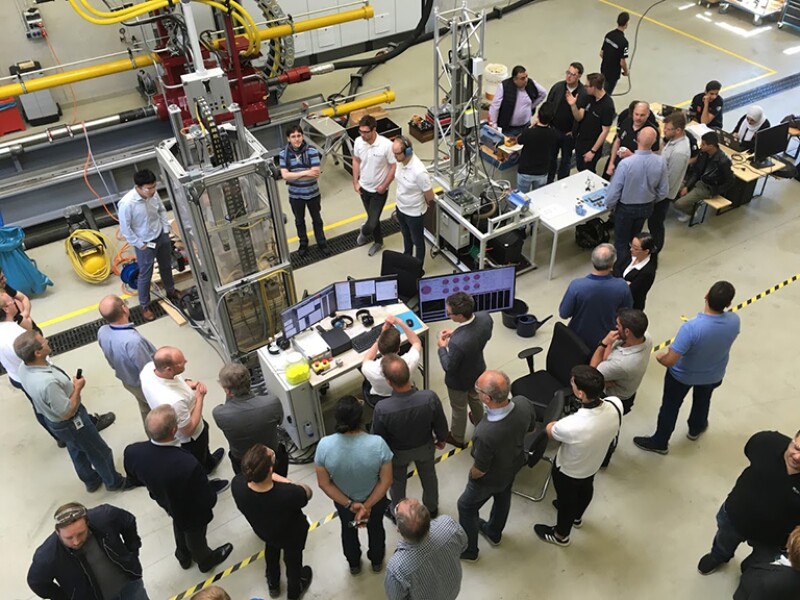Drillbotics is an international competition for university students to design and build a small drilling rig that uses sensors and control algorithms to autonomously drill an unknown rock sample. Alternately, they may create a full-scale virtual rig. In either category, teams will be given downhole targets only on the day of the final test and must automatically plan the trajectory and drill a directional well as efficiently as possible.
The collaboration between the SPE Human Factors and the SPE Drilling Systems Automation technical sections resulted in new requirements being added to the competition guidelines.
"Asking students to not only read about human factors but actually to integrate HF requirements into their designs is an important milestone for the drilling industry. When things go wrong on a rig, too often we see examples of the operator getting blamed for what HF practitioners may consider poor system design that leads to the equipment operator not having the needed information to diagnose a problem and intervene effectively,” said Marcin Nazaruk, chair of the SPE Human Factors Technical Section.
Considering how people interact with automated systems has been high on the agenda for many years across the high-hazard industries, including aviation, nuclear, or healthcare, and is at the forefront of research when designing self-driving cars. Its recognition has also been growing in the oil and gas industry.
The concept that “machines” (automation) are better at some tasks than humans and vice versa has been prevalent for decades.
Two examples:
- Humans surpass machines in respect to their ability to improvise and use flexible procedures.
- Machines surpass humans in respect to their ability to handle highly complex operations (i.e., do many different things at once).
"It may appear that there are very few downsides to providing very high levels of automation with little to no required user input. However, there is no such thing as a 'free lunch,' and there are overlooked downsides to providing high levels of automation, usually termed the 'ironies of automation' which must be suitably managed," said Peter Gibson, human factors specialist of Human System Interactions Ltd., a supporter of the competition.
Two examples of such ironies:
- Any autonomous system is ultimately conceived and designed by humans. Attempts to design out the human merely shift the responsibility further up the chain. Operators involuntarily inherit the biases and performance shaping factors that influenced the design team.
- The autonomous system cannot account for unforeseeable scenarios. This is one of the predominant reasons humans remain part of complex systems, to address the “unknown unknowns.” However, expecting human operators to flip between a passive monitoring role and an active “doing” role is difficult to achieve. As a result, they may be out of the loop, and their situation awareness may be compromised.
As part of the 2021–2022 Drillbotics guidelines, students will be asked to consider what information operators need and determine how to best present it so that the operator can always remain in the loop and effectively intervene if things do not go to plan.
The competition participants will also learn about
- Levels of automation
- The basics of human factors engineering and design
- Alarm management and alarm philosophy
- User-interface design
- Case studies in which automated systems contributed to problems
- Human factors in remote operations, and many others
"We are introducing HF this year so that teams will get the basics of this science that is relatively new to our industry," said Fred Florence, president of Rig Operations and vice-chair of the competition’s leadership team.
To learn more about human factors in drilling automation, see Section 11 of the Drilling Systems Automation Roadmap Report on Human-Systems Integration or the 2020 SINTEF report on human-centered design in drilling and wells.

Marcin Nazaruk is a human performance and culture leader at Baker Hughes and a chairperson of the SPE Human Factors Technical Section. He has held a number of senior leadership roles in the energy industry focused on the practical and scalable implementation of human performance strategies, tools, and solutions. Nazaruk has an applied PhD in human factors and a broad range of advanced qualifications in management (MBA), industrial psychology, systems thinking, culture change, or behavioral science. The multidisciplinary approach led to innovative but highly practical solutions that attracted multiple industry awards. He is the author of multiple industry guides published by the IOGP, SPE, or Energy Institute. He can be reached at https://www.linkedin.com/in/marcinnazaruk/.

Peter Gibson is a freelance, experienced human factors specialist working for Human System Interactions Ltd. He is a chartered member of the CIEHF and the IET. Gibson has 15 years’ experience working across the high-hazard industries including defense, nuclear, and oil and gas with emphasis on the implementation and integration of human factors throughout the engineering life cycle, requirements derivation, human-machine-interface design, and user evaluation. He also has significant experience working in the safety sector, including human reliability assessment and safety claim substantiation. He can be reached at www.linkedin.com/in/peter-gibsonhf/.

Fred Florence is the president of Rig Operations LLC and is retired from National Oilwell Varco as director of advanced drilling technology. He previously worked for several drilling contractors in engineering and operations roles in both land and offshore. He has served previously as chairman of the Drilling Systems Automation Technical Section and remains as an active volunteer leading the Drillbotics competition. He is a former SPE Distinguished Lecturer and has authored or coauthored numerous SPE papers on drilling automation. Florence holds a BS in electrical engineering from Southern Methodist University, as well as an MA in international management and an MBA in marketing from the University of Texas at Dallas.

